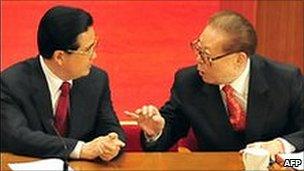How China is ruled: Party elders
- Published
Party elders
Senior leaders sometimes retain great influence over decisions and appointments long after they officially step down from power.
The most prominent example was Deng Xiaoping, who remained paramount leader even when his only remaining official post was chairman of the China Bridge Association.
Former President Jiang Zemin is thought to have been closely consulted over the 2012 leadership changes, and outgoing leader Hu Jintao is being closely watched to see how he plans his retirement.
Part of the reason the elders wield such influence is because of the patron-protege nature of Chinese politics.

Retirement does not mean losing your say
Leaders take care to manoeuvre their own supporters into the top ranks of the party and government bureaucracy.
This gives them sway over the new generation, even if that influence wanes as the new leaders gain more experience.
It is not simply about power for power's sake. In China, retiring leaders know that the verdict on their achievements can easily be reversed. They also have to look out for their children, whose wealth and success becomes vulnerable to attack if their own standing declines.
As compensation, elders get a privileged and pampered retirement. They are guaranteed elite bodyguards, special housing, secretaries and drivers, as well as access to restricted documents and information.